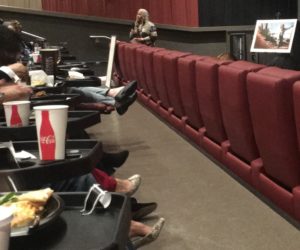
“Harriet” turns out to be perfect fund-raiser for Civil Rights Institute
James Thomas
Outlook Writer
It didn’t take Brian Forbing long to get the gist of what was happening after she arrived at CMX Cinemas in Falls Chase. She was there last Friday night to support a special screening of the movie “Harriet,” a fund-raiser for the Civil Rights Institute at FSU.
Prior to the start of the movie the event featured a live slave character.
“Once I saw the guy came down in a slave costume (and) began to sing ‘wade in the water,’ I knew this would be worth it,” Forbing said. “This was my first time attending an event like this and the movie was amazing.”
The much- anticipated film “Harriet,” was a perfect fund-raiser for the Institute.
A $50 donation was the ticket to a reception. It featured speakers and a meal.

Guests were treated to background information before viewing the movie “Harriet.”
Photo by James Thomas
A central part of the movie focuses on how Harriet Tubman made the transition from being a slave to becoming the one who led hundreds to freedom. The movie also brought to the big screen some of Tubman’s life experiences that she endured.
Octavia Thomas, a board members of the Civil Rights Institute, said the movie was a perfect fit with a worthwhile message.
“The message in the movie is about freedom, there are still so many things that we’re not free from,” Thomas said. “I think the purpose in us having the event is to show there is still liberation to be met.”
Thomas called Tubman an example of fortitude because she endured several challenge in the struggle for freedom.
The civil rights institute is embedded in the School of Library Science at FSU. The institute is used as a higher learning tool for the study of civil rights.
During its first event last year, the Institute advocated for Amendment 4. The Constitutional amendment restores the voting rights of felons, most who are Black.
Just two weeks ago, the Institute staged “1619 and Beyond.” The event was held at Union Bank, which was established as a financial institution for emancipated slaves.
It was a collaboration between the Institute and the Black Archives Research Center at FAMU. The focus was on the 400th anniversary of the arrival of the first slaves from West Africa in 1619.
Fred Flowers, one of the driving forces behind the Institute, said it will remain visible in the community.
“We’re going to have a musical march through history (and) it’s going to be fascinating,” Flowers said, “There’s not a when yet; it’s just an idea and that’s how things evolve.”







